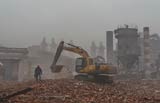Helping aged also helps the economy
By Ed Zhang (China Daily) Updated: 2015-06-01 08:57But the city's nursing homes have only 80,000 beds, and suffer from a shortage of qualified nurses.
Around half of the nursing homes are located outside the city's Sixth Ring Road. A survey showed that 45 percent of the city's nursing home dwellers complained that their institutions do not provide residential medical services.
An aging population is not specific to Beijing. It must also be happening in the cities that have reported weak consumer spending growth in recent months. There are reports that aging problems are more serious in Shanghai.
However, in contrast with such a huge unmet demand on the everyday level, government officials and their favorite advisers tend to look at other things when they talk about development. They talk about innovation, about somehow and somewhere finding the nation's new growth engine, and about the digital economy.
An official at a university in Shanghai recently said that in 2020 China's yield of data would amount to 2.4 zettabytes, nearly a quarter of the total data in the world. There was also a report that the country's annual spending on research and development was already 1.2 trillion yuan ($193.6 billion).
But no one seems to care how much data or research funding is used to improve the care and services for the aging population, or for serious economists, to generate real consumer spending.
The author is editor-at-large of China Daily. Contact the writer at edzhang@chinadaily.com.cn
- Beware of capital account liberalization
- Climate's right to grow pro-environment financing for sound growth
- Green shoots of new bond market in China
- Cross-border online sales picking up steam
- Twin-track approach needed
- Model designer fashions her career
- More women shattering glass ceiling
- Early education is too early and too much

















